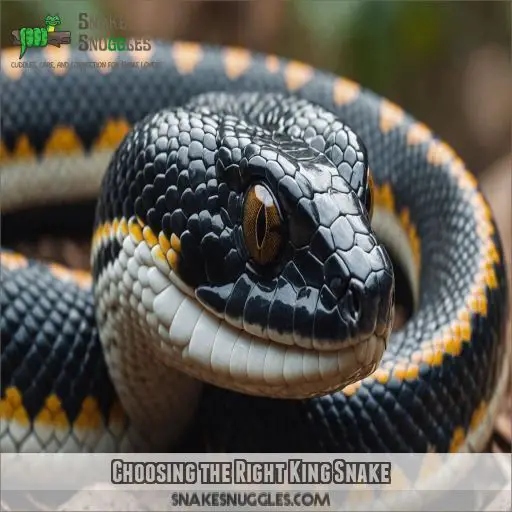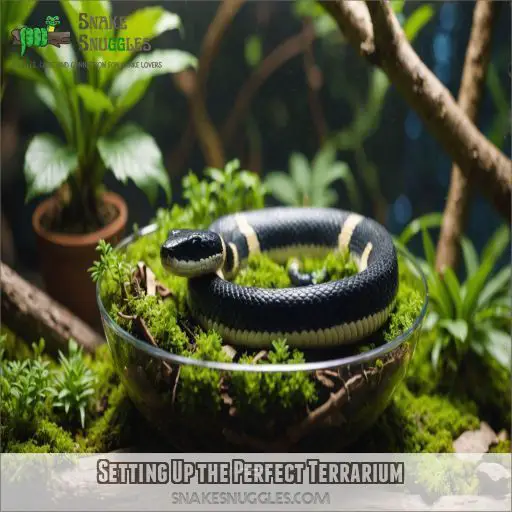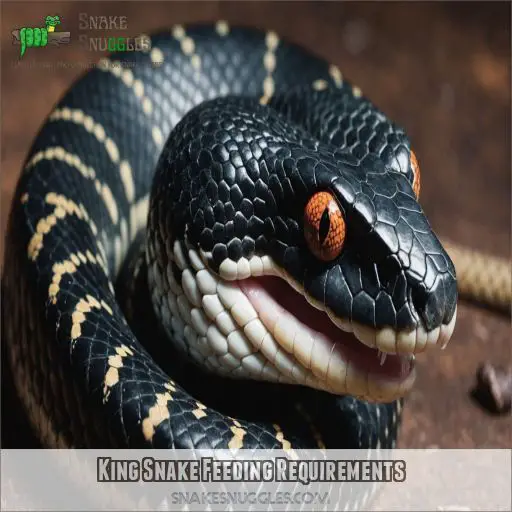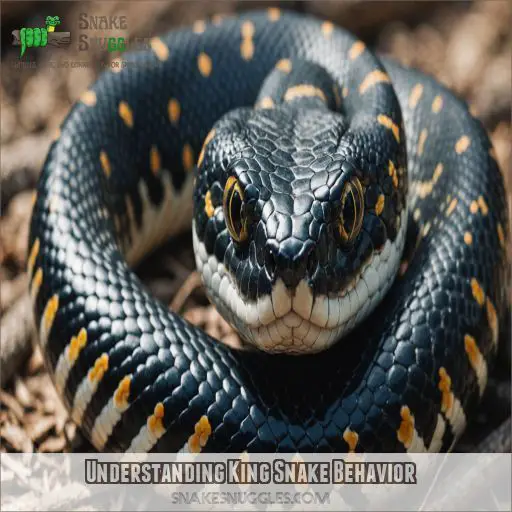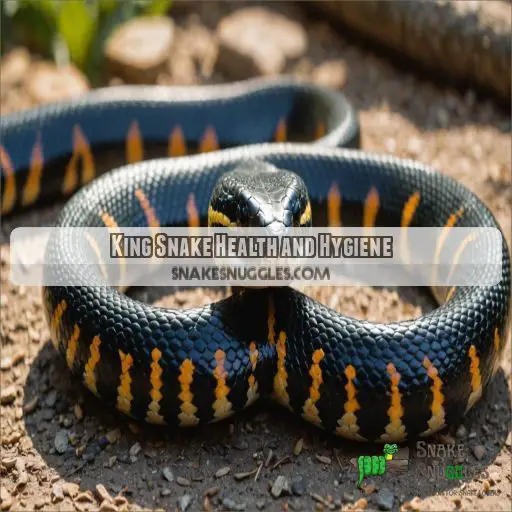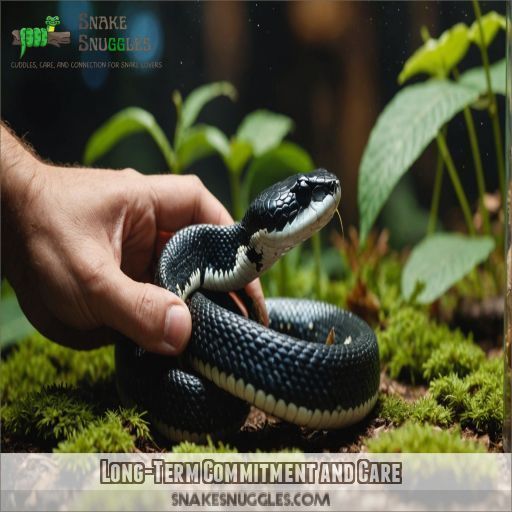This site is supported by our readers. We may earn a commission, at no cost to you, if you purchase through links.
 Considering a slithery companion? King snakes can make great pets for reptile enthusiasts!
Considering a slithery companion? King snakes can make great pets for reptile enthusiasts!
You’ll want to research different species, like the Mexican black kingsnake or hypo mosaic king snake, to find the perfect fit.
They’re relatively small, gentle, and easy to care for.
With a proper terrarium setup, a balanced diet, and regular handling, your king snake will thrive.
But, be aware: they have specific needs, like a temperature gradient and humidity control.
By understanding their requirements, you’ll be well on your way to becoming a pro snake parent.
And, that’s just the beginning – there’s a whole world of surprising facts to discover!
Table Of Contents
- Key Takeaways
- Choosing the Right King Snake
- Setting Up the Perfect Terrarium
- Providing the Right Environment
- King Snake Feeding Requirements
- Are King Snakes Good Pets for Beginners?
- Understanding King Snake Behavior
- King Snake Health and Hygiene
- Handling and Interacting With King Snakes
- Long-Term Commitment and Care
- Frequently Asked Questions (FAQs)
- Are king snakes friendly?
- Do king snakes like to be handled?
- Can you keep a king snake as a pet?
- Do king snakes make good pets for beginners?
- What is the average cost of owning a king snake?
- Can king snakes be kept in pairs or groups?
- How often do king snakes shed their skin?
- Can king snakes be taken out of their enclosure for exercise?
- Are king snakes prone to any specific health issues?
- Conclusion
Key Takeaways
- When considering a king snake as a pet, you’ll want to research different species, such as the Mexican black kingsnake or hypo mosaic king snake, to find the perfect fit for your lifestyle and preferences. With over 20 species, each has its unique characteristics, habits, and needs, so it’s essential to choose a pet that’s a great fit for you.
- King snakes can make great pets for beginners because they’re calm, have manageable care requirements, and don’t require a lot of space. However, you need to understand their needs and what you’re getting yourself into before you bring one home, including their specific temperature, humidity, and feeding requirements.
- To keep your king snake happy and healthy, you’ll need to provide a proper terrarium setup, a balanced diet, and regular handling. This includes a temperature gradient of 75-90°F, 40-60% humidity, and a varied diet that mimics their natural hunting habits, as well as a large enough water dish and strategic hideout placement.
- As a responsible king snake owner, you’ll need to prioritize their health and hygiene, recognizing common health issues, mastering terrarium cleaning and disinfecting, and maintaining proper hygiene practices. Regular veterinary check-ups and a clean, well-maintained enclosure can help prevent health issues and ensure your pet lives a long, happy life.
Choosing the Right King Snake
You’re thinking of bringing a king snake into your life, but with so many species and color variations out there, you really need to choose the right one that fits your lifestyle and preferences.
You’ll be well on your way to finding the perfect scaly companion by researching different king snake species, understanding their unique patterns and colors, and considering their habitat and space requirements.
Researching Different King Snake Species
Researching different king snake species is like finding your perfect match – you want a companion that fits your lifestyle.
With over 20 species, each has its unique characteristics, habits, and needs.
Consider factors like size, habitat, and feeding requirements to choose a pet that’s a great fit for you.
Start by exploring popular species like the Mexican black kingsnake or the hypo mosaic king snake.
Understanding Color Variations and Patterns
Now that you’ve researched different king snake species, let’s talk color! King snakes flaunt vibrant colors and patterns, making each one unique. Here are three key things to know:
- Color morph rarity: Some color morphs, like the lavender albino, are super rare and sought after.
- Pattern variation impact: Patterns can affect a snake’s camouflage and hunting success.
- Color identification guide: Study the color genetics to identify your king snake’s specific morph.
Considering Habitat and Space Requirements
Now that you’re smitten with the king snake’s stylish looks, it’s time to think about their habitat and space requirements.
You’ll need a secure, medium-sized terrarium with a 20-40 gallon enclosure.
Don’t worry, it’s not as huge as it sounds!
A good rule of thumb is to provide an enclosure that’s at least 4’x2’x2′ for an average king snake.
Setting Up the Perfect Terrarium
As you get ready to welcome your new king snake pet, you’ll want to make sure you set up the perfect terrarium that meets their unique needs. You’ll need to think about the ideal size, layout, substrate, temperature gradient, and humidity levels to create a comfortable and healthy environment for your slithery friend.
Terrarium Size and Layout Considerations
Setting up the perfect terrarium for your king snake! Think of it as designing a luxury home for your slithery friend.
For a medium-sized terrarium (20-40 gallons), prioritize good ventilation, a large enough water dish, and strategic hideout placement.
Don’t overdo it on decor – kingsnakes love simplicity.
Make sure there’s ample space for your snake to curl up, stretch out, and live its best life!
Substrate Options for a Healthy Environment
As a snake owner, you want the best for your pet, and it starts with the substrate. Avoid using gravel, sand, or wood shavings, as they can cause respiratory issues. Instead, opt for eco-friendly options like Aspen or recycled paper. A substrate depth of 1-2 inches is ideal, and cleaning frequency depends on your snake’s waste production.
Temperature Gradient and Humidity Levels
Now that you’ve got your substrate settled, let’s talk temperature and humidity! For a happy king snake, aim for a temperature gradient of 75-90°F (24-32°C) and maintain 40-60% humidity. Use thermometers and hygrometers to monitor levels. Don’t forget a temperature drop at night to mimic natural environments. Your snake’s health depends on it!
Providing the Right Environment
As you welcome a king snake into your home, providing the right environment is super important for its health and happiness – and yours too! By mastering the art of UVB lighting, temperature control, and humidity, you’ll create a haven that’ll make your king snake feel like royalty.
UVB Lighting and Photoperiods
Let’s talk UVB lighting for your king snake’s terrarium. You want to replicate the sun’s gentle warmth, not scorching heat. Here are four key considerations:
- UVB bulb types: T5 5.0 or 6% bulbs are great options.
- UVB benefits: Promotes calcium metabolism, prevents MBD.
- UVB placement: Place unobstructed on the warm side, 9-12 inches from basking surface.
- Photoperiod impact: Mimic natural daylight hours (12 hours) to regulate your snake’s circadian rhythms.
Maintaining a Suitable Temperature Range
King snakes are picky about their temperature – they need it just right, not too hot, not too cold. Aim for a temperature gradient of 78-85F, with a basking spot around 90-95F. Use heat mats or lamps with thermostats to maintain a stable temperature. Here’s a rough guide to get you started:
| Temperature Zone | Temperature Range | Heating Source |
|---|---|---|
| Basking Spot | 90-95F | Heat Lamp |
| Warm Zone | 85-90F | Heat Mat |
| Cool Zone | 75-80F | None/Ambient |
Creating a Hydration Station and Humidity Sources
Now that you’ve got the temperature just right, let’s talk hydration and humidity. Your king snake needs a water bowl large enough to soak in, and a humid environment to thrive. Here are three essentials to get you started:
- 1. Water bowl size: Choose a bowl that’s at least 2-3 times the length of your snake’s head.
- 2. Humidity gauges: Invest in a reliable hygrometer to monitor humidity levels (40-60% is ideal).
- 3. Misting schedules: Mist the enclosure lightly 2-3 times a week to maintain good humidity and keep your snake happy.
King Snake Feeding Requirements
As you welcome a king snake into your family, you’ll want to make sure you’re providing the right fuel for its growth and well-being. Let’s explore the nutritional needs, feeding frequencies, and supplement options that’ll keep your slithery friend thriving and happy in its new home.
Nutritional Needs and Food Sources
As a king snake owner, you’ll want to provide a varied diet that mimics their natural hunting habits. Include a mix of frozen-thawed mice, lizards, and snakes, and supplement with calcium to help keep their bones strong. A good rule of thumb is to
Feeding Frequency and Portion Control
Feeding your king snake is a balancing act. Overfeeding can lead to weight gain and health issues, so controlling portion sizes is important. Here are three key considerations:
- Feed juvenile king snakes once a week with small, frozen-thawed prey.
- Adult king snakes can be fed every two weeks with a single, larger meal.
- Monitor your snake’s weight and adjust feeding frequencies accordingly.
Supplementing the Diet for Optimal Health
Now that you’ve got a handle on feeding frequency and portion control, let’s talk supplements!
To make sure your king snake is getting all the nutrients it needs, consider adding calcium, vitamin D3, and multivitamins to its diet.
If you’re feeding live prey, gut loading is also a great way to boost nutrient intake.
Think of it as a healthy smoothie for your snake!
Are King Snakes Good Pets for Beginners?
If you’re thinking about getting a king snake, you’re probably wondering if they’re a good fit for a beginner pet owner.
King snakes can be a great choice for new snake owners because they are calm, have manageable care requirements, and don’t need a lot of space.
However, you need to understand their needs and what you’re getting yourself into before you bring one home.
Temperament and Handling Expectations
Now that you know what to feed your king snake, let’s talk handling. Are king snakes good pets for beginners? Absolutely! Their calm demeanor makes them a great choice. Here are a few things to keep in mind:
- King snakes are generally docile, but may nip if stressed or scared.
- Handle them gently, supporting their body.
- Watch for stress signals like hissing or flattening.
- Socialization is key to a calm, well-behaved snake.
Assessing the Level of Care Required
You’re thinking about getting a king snake? Cool! But before you dive in, it’s good to get a handle on how much care they need. Here’s a quick peek at what you’re getting into:
| Care Requirement | Level of Commitment |
|---|---|
| Time commitment | 2-3 hours/week (feeding, cleaning, handling) |
| Space needs | Medium-sized terrarium (20-40 gallons) |
| Diet complexity | Moderate (varied prey, supplements) |
Can you manage this level of care?
Potential Challenges and Considerations
As you consider bringing a king snake into your life, remember that with great pet power comes great responsibility. Here are some potential challenges to keep in mind:
- Housing costs can add up, especially if you need to upgrade to a larger enclosure.
- Vet care for reptiles can be pricey and harder to find.
- Legal restrictions may apply in your area, so be sure to check local laws before bringing a king snake home.
Understanding King Snake Behavior
As you welcome a king snake into your life, understanding its behavior is really important for building a strong bond and ensuring its well-being. By recognizing your king snake’s quirks, likes, and dislikes, you’ll be better equipped to create a happy and healthy environment that meets its unique needs.
Habitat Enrichment and Decor Ideas
As you create a haven for your king snake, think of it as designing a natural playground. Add some branches for climbing, plants for exploring, and a few hides to make your snake feel secure. You can use cork rounds, flats, or grape wood to create a cozy atmosphere. Get creative and have fun with it!
Providing Hiding Places and Visual Barriers
When designing your king snake’s enclosure, don’t forget to include decorative hides and visual barriers. These provide stress reduction and privacy benefits, making your pet feel secure. Incorporate natural materials like rocks, plants, and driftwood to create cozy hiding spots. A well-designed enclosure with ample hiding places will keep your king snake happy and relaxed.
Recognizing and Managing Stress Signals
- Changes in body language: A stressed snake will tense up, flatten its body, or vibrate its tail.
- Hiding behavior: If your snake is hiding more often, it may be feeling anxious.
- Rapid breathing patterns: A stressed snake will breathe more quickly than usual.
- Color changes: Some king snakes may darken or lighten in color when stressed.
King Snake Health and Hygiene
As you welcome a king snake into your life, it’s important to prioritize their health and hygiene to make sure they’ve a happy, long-term companionship. By recognizing common health issues, mastering terrarium cleaning and disinfecting, and maintaining proper hygiene practices, you’ll be well on your way to becoming a snake-savvy owner and giving your pet the best life possible.
Recognizing Common Health Issues
As a king snake owner, it’s important to recognize common health issues to help your pet live a long, happy life. Keep an eye out for signs of parasite prevention, respiratory issues, shedding problems, skin infections, and appetite loss. Consult a vet if you notice any unusual behavior or symptoms, and stay proactive about preventative care.
Cleaning and Disinfecting the Terrarium
Time to get scrubbing! Cleaning your king snake’s terrarium regularly is really important for their health. Aim for a weekly spot-cleaning and a full disinfect every 2-3 weeks. Use a reptile-safe disinfectant and tools to avoid harming your snake. Replace the substrate completely every 2-3 months. Create a schedule to stay on track and keep your snake’s home squeaky clean!
Maintaining Proper Hygiene Practices
Now that you’ve cleaned and disinfected the terrarium, it’s time to maintain those good habits. To keep your king snake healthy, remember:
- Wash your hands before and after handling your snake or its environment.
- Change the water bowl daily to prevent bacterial growth.
- Replace the substrate completely every 2-3 months to prevent parasite buildup.
Handling and Interacting With King Snakes
As you get ready to bring a king snake into your life, you’re probably wondering what it’s like to handle and interact with these beautiful creatures. With gentle handling techniques, a well-planned handling schedule, and a focus on supporting their slender bodies, you can build trust with your king snake and create a stress-free experience for both of you.
Gentle Handling Techniques and Safety Precautions
When handling your king snake, remember to support its body and lift from below. Move slowly and deliberately to avoid startling it. Watch for stress signals like flattening or hissing, and give your snake space if it shows these signs. Handle your snake gently and briefly, about once a week, to prevent stress and potential bites.
Building Trust and Creating a Handling Schedule
Building trust with your king snake takes time and patience.
Start with short handling sessions, no more than five minutes long.
Gradually increase the time as your snake becomes more comfortable.
Aim for at least weekly handling, but no more than daily.
Watch for stress signals and reward calm behavior with positive reinforcement.
This is a win-win for both you and your slithery friend!
Supporting the Snake’s Body and Reducing Stress
Now that you’ve built trust with your king snake, it’s time to focus on supporting its body and reducing stress. You want your snake to feel comfortable and secure in your hands. Here are four tips to get you started:
- 1. Lift from below, allowing your snake to curl around your hand or arm.
- 2. Use slow, deliberate movements to avoid startling your snake.
- 3. Provide gentle support along the length of its body, especially during handling sessions.
- 4. Monitor for stress signs, such as flattening or trying to escape, and adjust your handling schedule accordingly.
Long-Term Commitment and Care
When you’re thinking about welcoming a king snake into your home, it’s important to consider the long-term commitment and care needed to keep these amazing creatures happy and healthy.
King snakes can live for over 20 years, making them a rewarding but significant responsibility.
It’s vital to plan ahead and make sure you can provide the necessary care and attention for the life of your new scaly friend.
King Snake Lifespan and Life Expectancy
You’re thinking of bringing a king snake into your life, but how long can you expect your slith
Providing a Long-Term Plan for Care
Now that you know king snakes can live up to 20 years, it’s important to plan for their long-term care. As your pet grows, its needs will change, and being prepared will help make sure they’ve a happy, healthy life. Here are some key considerations:
- Schedule regular veterinary check-ups to monitor health and address any issues early on.
- Plan for enclosure upgrades as your snake grows and its needs change.
- Be prepared to make dietary changes as your snake ages, including adjusting feeding frequencies and food types.
Rehoming Considerations and Alternatives
If you’re facing a situation where you can’t care for your proper habitat and care, don’t panic
!
Reach out to friends, local shelters, or rescue organizations for help.
You can also consider temporary care or surrender options.
Finding new homes for your pet can be tough, but with the right resources, you can make sure their well-being is taken care of.
Frequently Asked Questions (FAQs)
Are king snakes friendly?
You’ll love king snakes’ friendly nature – they’re generally docile, calm, and non-aggressive, making them perfect for handling . With proper care, they can become your new slithery BFFs !
Do king snakes like to be handled?
You’ll be thrilled to know that king snakes are amazingly docile and love being handled – well, maybe not "love," but they tolerate it wonderfully! With gentle care and gradual handling, they’ll become your new slithery BFFs.
Can you keep a king snake as a pet?
You can definitely keep a king snake as a pet! They’re relatively low-maintenance, gentle, and come in a variety of colors. Just be prepared to provide a proper habitat, diet, and handling, and you’ll have a slithery friend for years to come (Source).
Do king snakes make good pets for beginners?
As you ponder your first pet snake, ask yourself: are you ready for a slithery soulmate? King snakes make great beginner pets, offering a calm demeanor, manageable size, and easy handling – a perfect blend of freedom and control.
What is the average cost of owning a king snake?
You’re considering bringing a king snake into your life, but what’s the financial commitment? Owning a king snake can cost around $300 to $500 initially, with monthly expenses ranging from $20 to $50 .
Can king snakes be kept in pairs or groups?
You shouldn’t keep king snakes in pairs or groups. As ophiophagus, or snake-eaters, they may turn on each other. Single housing is best to prevent cannibalism and help your pet feel comfortable and safe (Source).
How often do king snakes shed their skin?
You might be surprised that king snakes shed their skin in one piece, usually every 4-6 weeks, as they grow and renew their skin. As a responsible owner, you’ll want to maintain proper humidity levels to facilitate successful shedding (Source).
Can king snakes be taken out of their enclosure for exercise?
You can definitely take your king snake out for exercise, but do it gently and briefly, about once a week. Let it crawl onto your hand, and support its body as it slithers around – it’s great bonding time!
Are king snakes prone to any specific health issues?
You’ll want to watch out for respiratory infections, parasitic infestations, and skin problems like scale rot in your king snake . Regular veterinary check-ups and a clean, well-maintained enclosure can help prevent these issues .
Conclusion
Are you thinking about getting a king snake as a pet?
They can be great companions if you’re willing to learn about their needs.
King snakes need specific care, including the right temperature, humidity, and food.
If you’re ready to take on the responsibility of caring for a reptile, a king snake might be a good choice for you.

